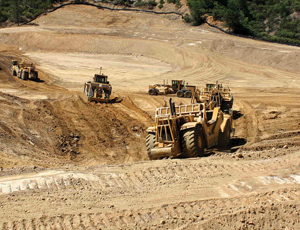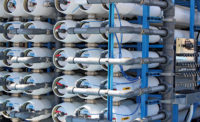Despite sagging revenue at state and local levels, numerous environmental projects in the U.S. are moving ahead, driven by continued regulatory demands and a growing interest in sustainability. In the water and wastewater market, funding sources began to stabilize this spring as money from the American Recovery and Reinvestment Act helped prop up some plans and financing started to flow through the bond market again.

“We all saw a slowdown in the fourth quarter of 2008, when the capital markets froze up and impacted investment,” says Alan Krause, president and chief operating officer of MWH, Broomfield, Colo. “We saw that loosen up a lot in the first quarter, primarily with the municipal markets. We still worry about the states that have overall budget problems, but in general things have stayed steady.”
MWH was awarded more than $500 million in contracts over the last year, including a $165-million contract to expand the Pima County, Ariz., Wastewater Reclamation Dept.’s 37.5-million-gallon-per-day Ina Road wastewater-treatment plant to 50 mgd. The project is part of the Pima County Authority’s $720-million Regional Optimization Master Plan to meet a state mandate to reduce concentrations of nitrogen and ammonia in effluent. When the credit markets froze last fall, the authority moved a bond ballot initiative from the November 2008 election cycle to November 2009 and scheduled three user-rate increases for this year to help bridge the funding gap.
In February, MWH also began work on $220 million in clean-water projects for Tallahassee, Fla., to build tertiary-treatment works for the 26.5-mgd Thomas P. Smith Wastewater Reclamation Facility and the 4.5-mgd Lake Bradford Road Wastewater Treatment Facility. In October, the company signed a $115-million contract to expand and upgrade to 60 mgd the 45-mgd Central Weber Wastewater Treatment Plant in Ogden, Utah.
Stimulus Spurs Work
Stimulus money is also starting to work its way through the system. Under ARRA, $4 billion will be distributed to clean water state revolving funds and another $2 billion for drinking water state revolving funds. Dan McCarthy, president and CEO of Overland Park, Kan.-based Black & Veatch’s global water business, says, when spread out across the country, stimulus dollars will offer some relief but won’t fill the gap.
“It is a stimulus, but it’s not taking the place of traditional funding sources for capital investment,” he says.
Still, McCarthy adds that some design work has come from stimulus projects. “With the aggressive schedules, there’s some new design work to get these projects qualified in time,” he says. “We’re seeing some fast-track design work and awards in multiple phases so projects can qualify as being started within the time frame [mandated under ARRA].”
The stimulus package also infuses $4.6 billion for the Army Corp of Engineers’ backlog of water-resource projects and $1 billion for the Bureau of Reclamation. “There has been a lot of work with the Corps and the Bureau of Reclamation that has been unfazed by the recession,” Krause says. “As long as that money continues to flow, we feel comfortable with the backlog of work we have.”
Beyond the stimulus, many firms expect to see future environmental work ramp up under the Obama administration. McCarthy anticipates stricter enforcement efforts from the U.S. Environmental Protection Agency as well as a greater emphasis on renewable energy and sustainable practices.
“The EPA and the new administration are not indicating they will rest on their laurels,” he says. “There will be some tightening of water-quality standards going forward. We’re already seeing more water and wastewater authorities interested in their carbon footprint, and we expect those discussions to be [escalated].”
Black & Veatch is in final design stages of a facility for Clean Water Coalition, a group of four Las Vegas-area water agencies in Nevada, that will collect up to 600 mgd of effluent treated to tertiary standards from three...


Post a comment to this article
Report Abusive Comment